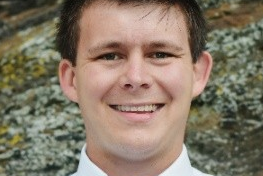-
About
- Departments & Offices
-
Academics
- Physician Assistant
- Special Master’s (MBS)
-
Admissions & Financial Aid
- Tuition & Fees
-
Student Life
-
Research
- Research Labs & Centers
-
Local & Global Engagement
- Global Health Program
Questions for a Recent Grad
Reece Lyerly (MS-Nutrition/MPH ‘17)

We sat down with Reece Lyerly, Tufts MS/MPH ‘17, to find out about his experiences in the Tufts MPH program.
Are you currently working in Public Health?
I work as a Program Evaluator at the Rhode Island Public Health Institute. I am the lead evaluator on programs that focus on health equity, and that spans both chronic and infectious diseases. We operate a local produce market called Food on the Move and I have been organizing a survey that looks at how we’re impacting fruit and vegetable consumption and food security. We do a lot of data management and analysis, so we can use our programs to inform policy, advocacy, and the dissemination of results.
What led you to the MPH Program at Tufts?
I went to a small liberal arts college for undergrad and, afterward, I ran a community garden program there. The ability to focus on nutrition and public health had a lot of appeal and I was able to do a dual MS in Nutrition and MPH with the Friedman School of Nutrition Science and Policy at Tufts. I also knew that the Public Health program was very strong and they did a lot of community-based research. I was drawn to the idea of working with great researchers and professors doing applied research that makes a difference in the community.
What were the highlights of your Tufts experience?
I took a course called Program Evaluation that was taught by program evaluators at the Institute for Community Health. It was the class that brought all the pieces of my studies together for me. It made me say, “This is what I want to do.” Being in that class, being taught by people who were in the field doing it, that set the pathway for what I ended up doing post-graduation.
Were there any faculty you particularly connected with?
Oh, wow, how do I identify just one? I have strong relationships with so many faculty. One that comes to mind is Ginny Chomitz. We were doing a food system assessment in Somerville, MA. She provided great guidance and became a close mentor to me. We were doing focus groups in the community—I’m more of a quantitative stats kind of guy—and that got me out of my comfort zone. Ginny has a way of doing really high-quality research while making sure it’s community focused and community driven.
What was your Applied Learning Experience like?
I worked at Boston Public Schools, evaluating the Youth Behavioral Risk Survey at the middle schools to see if there was any difference in health risk behaviors among the LGBT students compared to their heterosexual peers. There’s a lot of evidence among high school students around the negative health behaviors that LGBT students experience, but there’s not a lot of data out there about what happens at the middle school level. I was able to analyze data and conduct interviews with administration, looking at the supportive policies that are in place at BPS. It was a great ALE experience—it really challenged me as a student.
What was your career search like?
I utilized the Career Services Office a lot. I absolutely loved the resources that were available. I got to know the Career Services staff at the very beginning of my graduate education, so they already knew who I was and what I was looking for. They helped me make decisions about internships and ALE opportunities along the way, as well as when it came to applications and decisions about my job.
Ultimately, I was sharing my career interests and thoughts with professor Kimberly Dong, who I did a Teaching Assistantship with. She made the introduction to the Rhode Island Public Health Institute, where I’m currently working. So, it is also about relationships you form. That’s something I had heard from many students who had gone here—and it was a big reason why I chose Tufts.